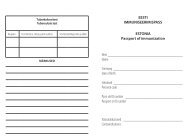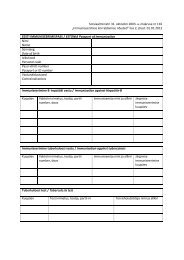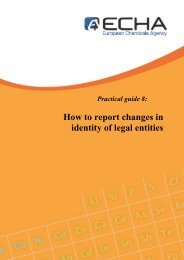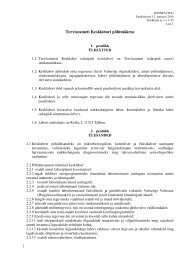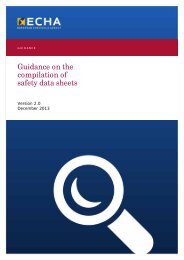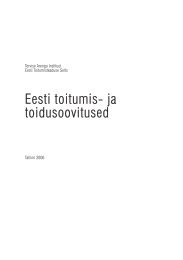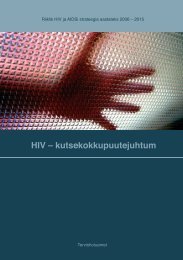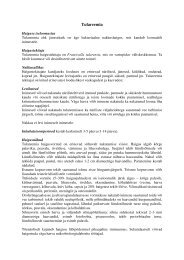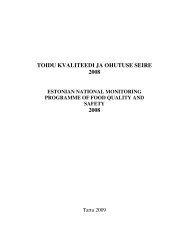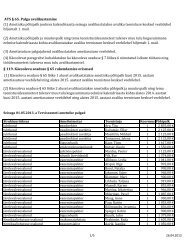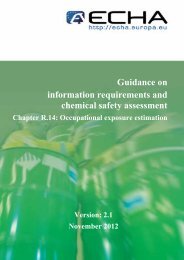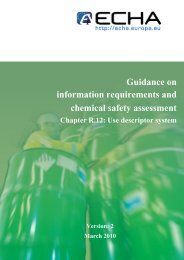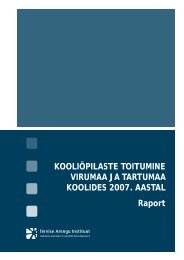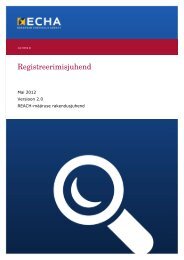Guidance for monomers and polymers - ECHA - Europa
Guidance for monomers and polymers - ECHA - Europa
Guidance for monomers and polymers - ECHA - Europa
You also want an ePaper? Increase the reach of your titles
YUMPU automatically turns print PDFs into web optimized ePapers that Google loves.
20<br />
<strong>Guidance</strong> <strong>for</strong> <strong>monomers</strong> <strong>and</strong> <strong>polymers</strong><br />
Version 2.0 April 2012<br />
3.2.1.3 Case of a natural polymer or a chemically modified natural polymer<br />
Natural <strong>polymers</strong> are understood as <strong>polymers</strong> which are the result of a polymerisation process<br />
that has taken place in nature, independently of the extraction process with which they have<br />
been extracted. This means that natural <strong>polymers</strong> are not necessarily ‘substances which occur<br />
in nature’ when assessed according to the criteria set out in Article 3(39) of the REACH<br />
Regulation.<br />
Following Article 2(9) of REACH, any polymer meeting the criteria of Article 3(5), whether<br />
natural <strong>polymers</strong> or not, does not have to be registered. This exemption from registration<br />
includes natural <strong>polymers</strong> which are chemically modified (e.g. post-treatment of natural<br />
<strong>polymers</strong>).<br />
Monomer substance(s) <strong>and</strong> other substance(s) ending up in the <strong>for</strong>m of monomeric units <strong>and</strong><br />
chemically bound substance(s) in natural <strong>polymers</strong> can, <strong>for</strong> practical reasons, be treated as<br />
“non-isolated intermediates” <strong>and</strong> do not have to be registered.<br />
In the case of chemically modified natural <strong>polymers</strong>, the building block monomer substance(s)<br />
<strong>and</strong> other substance(s) in the <strong>for</strong>m of monomeric units <strong>and</strong> chemically bound substance(s)<br />
similarly originating from the natural <strong>polymers</strong> can also, <strong>for</strong> practical reasons, be treated as<br />
“non-isolated intermediates” <strong>and</strong> do not have to be registered. However, any monomer<br />
substance or any other substance (within the meaning of Article 6(3)) used <strong>for</strong> the<br />
modification of the natural polymer <strong>and</strong> meeting the provisions of Article 6(1) <strong>and</strong> 6(3) needs<br />
to be registered accordingly, unless it has been registered up the supply chain. These<br />
registration obligations apply provided the chemically modified natural polymer itself meets the<br />
Article 3(5) polymer definition.<br />
Whenever it is not scientifically possible to identify <strong>and</strong> quantify the building blocks of a<br />
substance that is under consideration as to whether it is a natural polymer or not, this<br />
substance must instead of a natural polymer be regarded as a UVCB substance<br />
(see section 2.2 <strong>for</strong> further in<strong>for</strong>mation) that there<strong>for</strong>e has to be registered.<br />
3.2.1.4 Case of a recycled polymer<br />
Companies undertaking recovery of polymer substances from waste during which these<br />
substances cease to be waste are exempted from the obligation to register the monomer(s) or<br />
any other substance(s) meeting the provisions of Articles 6(1) <strong>and</strong> 6(3) in the recycled<br />
polymer. This exemption applies provided that these substance(s) constituting the recycled<br />
polymer have been registered <strong>and</strong> the in<strong>for</strong>mation on the registered substance is available to<br />
the company undertaking the recovery (Article 2(7)(d)).<br />
It is worth noting that this exemption does not require the substance to have been registered<br />
by an actor in the same supply chain. There<strong>for</strong>e, it is sufficient that a registration was made<br />
<strong>for</strong> the substance, either by an actor in the same supply chain or by a company in another<br />
supply chain.<br />
Further in<strong>for</strong>mation on the registration obligations <strong>for</strong> recycled or recovered substances is<br />
provided in the <strong>Guidance</strong> on Waste <strong>and</strong> recovered substances.<br />
If the monomer or any other substance is a phase-in substance, it is recommended that the<br />
recycler of the polymer pre-register that substance in order to benefit from the transitional<br />
provisions laid down in Article 23 even if later on that substance is exempted from the<br />
registration requirements by virtue of the fact that another pre-registrant registers the<br />
substance. Although the pre-registration period as well as the first deadline <strong>for</strong> late pre-<br />
Annankatu 18, P.O. Box 400, FI-00121 Helsinki, Finl<strong>and</strong> | Tel. +358 9 686180 | Fax +358 9 68618210 | echa.europa.eu



